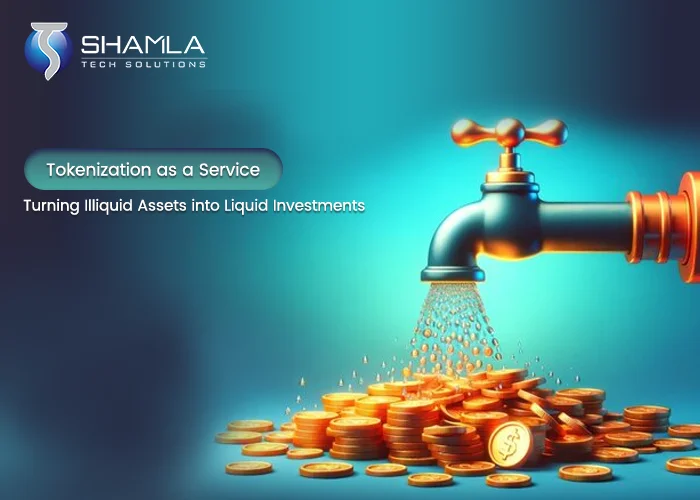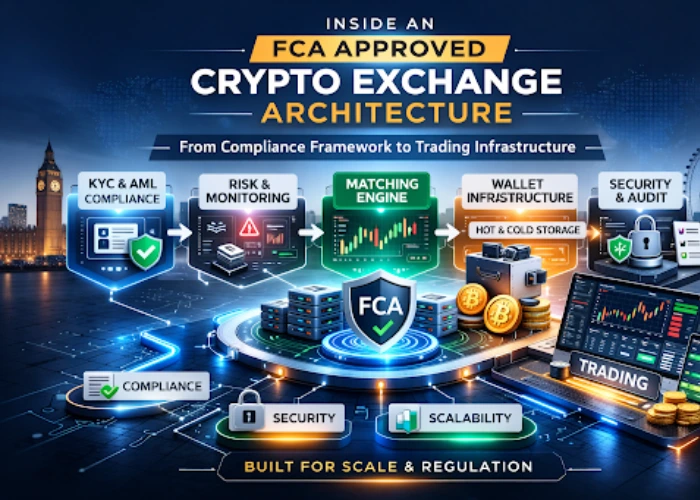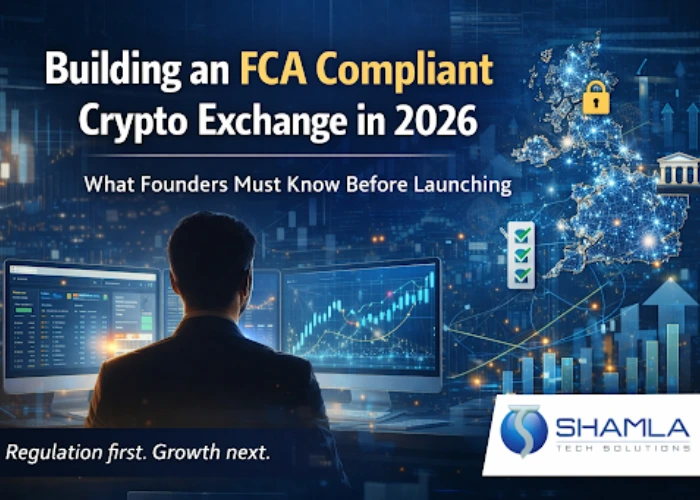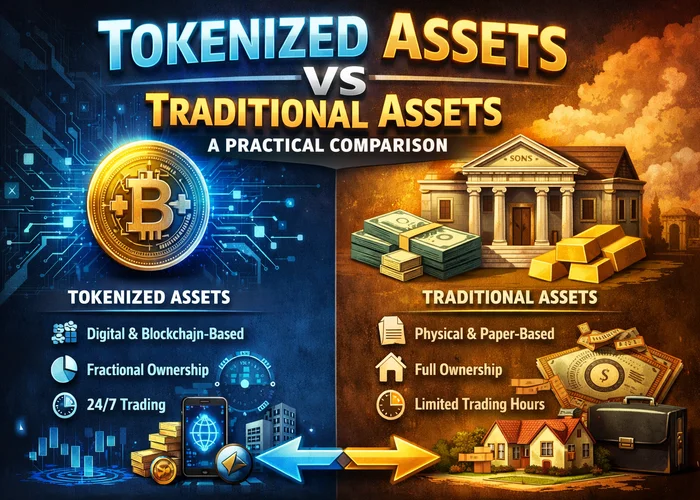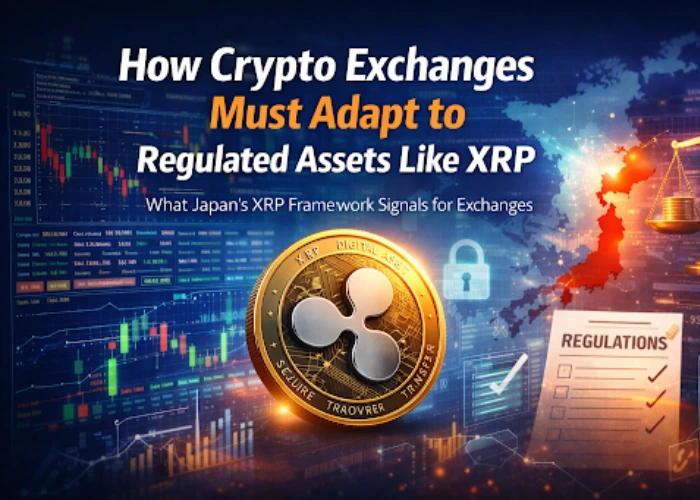In today’s dynamic financial landscape, Tokenization as a Service (TaaS) is reshaping how we perceive and manage assets by bringing traditional and digital investments onto the blockchain. Tokenization as a Service enables businesses to convert tangible and intangible assets into digital tokens, representing ownership in an entirely new way. Real World Asset Tokenization allows assets to be divided into smaller, tradable units, providing greater liquidity and accessibility.
A recent report by Binance Research highlighted that the market value of on-chain real-world assets (RWAs) has surpassed $12 billion. In 2022, Boston Consulting Group (BCG) projected that the tokenized asset market could soar to an impressive $16 trillion by 2030. Over the last few months, RWA tokens have been gaining significant traction, marking a pivotal shift in market dynamics. Real World Asset Tokenization is still in its early stages but is quickly shaping up to be a transformative force in the global financial landscape.
If you’re ready to tokenize your assets and access a broader investment market, partnering with a leading Asset Tokenization Company is essential. A trusted Tokenized Asset Development Company will guide you through the entire process, from legal structuring to token creation and distribution. In this blog, we will explore how Tokenization as a Service (TaaS) is transforming asset ownership and investment opportunities through Real World Asset Tokenization, highlighting its benefits, applications, and the innovative technology driving this shift. By embracing Real World Asset Tokenization development, businesses and investors can stay ahead of the curve in the rapidly transforming financial landscape.
Exploring Tokenization: Connecting Physical Assets to the Digital Realm
Tokenization is revolutionizing the way we manage and interact with assets by seamlessly bridging the gap between the physical and digital worlds. Through Real World Asset Tokenization, tangible assets like real estate, art, and commodities, as well as intangible ones like patents and securities, are converted into digital tokens on a blockchain. Each token represents a share of ownership, allowing for fractionalization—a concept that democratizes investment by enabling multiple investors to hold portions of an asset.
This transformation opens up new possibilities for liquidity, transparency, and global access. By breaking down traditional barriers, tokenized assets can be traded faster and more securely, giving investors greater flexibility. Blockchain’s decentralized nature ensures trust in the system, as all transactions are permanently recorded and verifiable. As businesses and investors embrace this technology, Tokenization as a Service (TaaS) is set to redefine ownership, trading, and investment in the digital era.
The Role of Tokenization as a Service
Tokenization as a Service (TaaS) is revolutionizing how businesses and individuals can digitize their physical and intangible assets. Without requiring advanced technical knowledge or a complex infrastructure, TaaS simplifies the process of converting assets into digital tokens by offering platforms that handle the heavy lifting. Acting as a key intermediary between asset owners and the blockchain ecosystem, TaaS provides essential tools, including security, compliance, and user-friendly interfaces, making Real World Asset Tokenization accessible to a broader audience.
Simplifying Asset Tokenization for Businesses
For businesses that wish to tokenize their assets, an enterprise-grade Asset Tokenization platform offers a scalable and secure solution. These platforms help companies navigate the complexities of Real World Asset Tokenization development, ensuring that legal and technical standards are met. Whether tokenizing real estate, intellectual property, or even commodities, these platforms offer businesses a seamless way to enter the tokenized market, maximize asset value, and expand their reach to global investors.
Unlocking Liquidity: The Game Changer
One of the most transformative aspects of Tokenization as a Service is its ability to bring liquidity to traditionally illiquid markets. Assets such as real estate, fine art, or high-value commodities, which are often difficult to trade, can now be fractionalized into smaller, tradeable units through Real World Asset Tokenization. This process allows investors to buy and sell portions of high-value assets, which were previously accessible only to those with significant capital.
Democratizing Investment with Fractional Ownership
Through fractional ownership, Asset Tokenization lowers the barrier to entry for investors, allowing them to participate in asset classes that were once out of reach. For instance, real estate tokenization enables individuals to purchase fractions of a property instead of the entire asset. This not only democratizes access to investment opportunities but also enhances market liquidity, allowing assets to be traded more freely and efficiently. Investors can make quicker decisions and adjust their portfolios dynamically, creating more flexible and responsive market conditions.
Enhanced Security Through Blockchain Technology
Tokenization as a Service ensures that all asset transactions and ownership transfers are secure, thanks to the underlying blockchain technology. The decentralized and immutable nature of blockchain guarantees that every transaction is transparent and protected against tampering. This provides unparalleled security for asset owners and investors, minimizing the risk of fraud. Additionally, smart contracts—automated contracts with the terms directly written into code—streamline the process of asset management, ensuring that transactions occur as stipulated without the need for intermediaries.
Ensuring Compliance in Tokenized Markets
An essential component of Real World Asset Tokenization development is regulatory compliance. Trusted Asset Tokenization Companies integrate compliance mechanisms into their platforms, ensuring that the tokenized assets adhere to the laws and regulations of the relevant jurisdictions. This includes meeting requirements for securities regulations, Know Your Customer (KYC) procedures, and anti-money laundering (AML) protocols. By embedding these frameworks, TaaS platforms provide a compliant and secure environment for both asset owners and investors, reducing risks and fostering trust in tokenized markets.
A New Era of Asset Management
Tokenization as a Service is transforming the financial landscape by unlocking liquidity, ensuring security, and simplifying compliance for a wide range of assets. By partnering with a reliable Tokenized Asset Development Company, businesses and investors can capitalize on the benefits of Real World Asset Tokenization, opening up new opportunities in previously inaccessible markets and setting the stage for a more inclusive and dynamic investment ecosystem.
How Asset Tokenization Works
Tokenization as a service is revolutionizing the financial landscape by converting real-world assets into digital tokens, unlocking new opportunities for investment and liquidity. Whether it’s Real World Asset Tokenization of real estate, commodities, or intellectual property, this process allows assets to be fractionally owned and traded on blockchain platforms, providing greater access and flexibility. Below is a detailed breakdown of how Asset Tokenization works:
1. Asset Identification
The first step in Real World Asset Tokenization development is identifying the asset to be tokenized. This could range from physical assets like real estate, commodities, or art to intangible ones like stocks or intellectual property. Choosing the right asset for tokenization is key as it sets the stage for fractional ownership and future trading.
For example, tokenizing a luxury property allows multiple investors to purchase shares, making it accessible to those who cannot afford to buy the whole asset. This is where a Tokenized Asset Development Company plays a crucial role, offering expertise in determining the right asset for tokenization.
2. Legal Structuring
The next essential step involves creating a legal framework that binds the ownership of the digital token to the underlying asset. Regulatory compliance is paramount here, ensuring that the token adheres to both local and international laws. This guarantees that token holders have enforceable rights over the asset, whether in the form of ownership, dividends, or other benefits.
A top-tier Asset Tokenization Company will help navigate the legal complexities, ensuring that the tokenized asset is compliant from the start. This step not only ensures the security of the token but also protects investors from legal risks.
3. Asset Valuation
Accurate asset valuation is crucial before tokenizing any asset. Independent valuation processes establish a fair price for the token, ensuring transparency for potential investors. This phase involves evaluating the asset’s market value, projected returns, and future growth potential.
For instance, a Tokenized Asset Development Company can assist in appraising a commercial property by analyzing market trends, rental income, and similar properties. Valuation sets the foundation for determining the number of tokens to be issued and their price.
4. Token Creation
Once the asset’s legal and valuation structures are in place, the digital tokens are created. These tokens represent fractional ownership of the asset, making it possible for investors to own a portion of high-value assets without needing significant capital. A Tokenized Asset Development Company can develop the blockchain infrastructure and smart contracts required for token creation, ensuring security and efficiency.
This stage ensures that each token is accurately linked to the asset, enabling transparent ownership transfer and management. Depending on the asset type, different blockchain platforms and token standards can be used.
5. Custody & Asset Management
Post-tokenization, assets need secure storage and management. This includes the physical protection of tangible assets and the secure handling of digital tokens. Whether it’s art, real estate, or intellectual property, proper custody ensures the asset’s safety and value retention.
Trusted custodians, often engaged by Asset Tokenization Companies, manage both physical and digital aspects of the asset, providing a seamless experience for investors.
6. Token Distribution & Trading
Once tokens are created, they are distributed to investors via platforms or exchanges. These tokens can be bought, sold, or traded in real-time, enabling higher liquidity in traditionally illiquid markets. Tokenization as a service facilitates this by providing access to blockchain trading platforms, where tokens can be exchanged seamlessly.
This step democratizes asset ownership, allowing smaller investors to participate in markets like real estate or fine art. Additionally, blockchain-based trading platforms offer transparency and security in token transactions.
7. Revenue Sharing & Dividends
For revenue-generating assets like rental properties or intellectual property, token holders can receive their share of income based on their ownership. Automated smart contracts handle the distribution of profits, ensuring that all investors receive their dividends transparently and securely.
For example, in the case of Real World Asset Tokenization of a commercial building, token holders receive a portion of the rental income. Smart contracts ensure that payments are made promptly and according to pre-defined conditions.
8. Ongoing Compliance & Reporting
Throughout the lifecycle of the tokenized asset, on-going compliance with regulatory frameworks is essential. Regular reporting ensures transparency and the blockchain’s immutable ledger guarantees that every transaction is auditable. This reassures investors that their assets are being properly managed.
An Asset Tokenization Company helps ensure continuous adherence to legal requirements, providing periodic updates on the asset’s performance and any regulatory changes that may affect the investment.
Tokenization: Challenges & Solutions
While Real World Asset Tokenization holds immense promise for revolutionizing markets, there are several challenges that must be addressed to fully realize its potential. Below are some key challenges and the solutions being implemented to overcome them:
1. Regulatory Uncertainty
One of the most significant hurdles in Real World Asset Tokenization is navigating the regulatory environment, which varies widely across regions and industries. Many jurisdictions are still developing frameworks to address the complexities of tokenized assets, which can create uncertainty for businesses and investors.
Solution: Partnering with an experienced Real World Asset Tokenization Company that understands the legal landscape is critical. This company can ensure compliance by embedding regulatory requirements directly into tokenization platforms, including Know Your Customer (KYC) and Anti-Money Laundering (AML) protocols.
2. Market Liquidity
Although tokenization as a service unlocks liquidity by fractionalizing assets, creating a truly liquid market where tokens can be easily traded requires sufficient demand and accessible marketplaces. Without these, tokenized assets can still face liquidity constraints.
Solution: To foster liquidity, Tokenized Asset Development Companies are developing decentralized exchanges (DEXs) and secondary marketplaces tailored to tokenized assets, allowing investors to easily buy, sell, and trade tokens across a broad spectrum of assets.
3. Security Concerns
Despite blockchain technology’s inherent security features, asset owners may still worry about the potential for hacking, fraud, or other cyber threats, especially if they are unfamiliar with blockchain systems.
Solution: Blockchain’s decentralized and immutable nature already mitigates many security risks. However, Real World Asset Tokenization Development platforms enhance this further by employing sophisticated encryption methods, multi-signature authentication, and secure custody solutions to safeguard tokenized assets.
4. Technological Complexity
Tokenizing assets requires a deep understanding of blockchain technology, smart contracts, and asset management, which can be a daunting challenge for traditional businesses unfamiliar with these technologies.
Solution: Tokenization as a service platform simplifies the process by offering user-friendly, end-to-end solutions that handle everything from token creation to management, enabling businesses to tokenize assets without needing to build or maintain their own blockchain infrastructure.
By addressing these challenges, Real World Asset Tokenization is steadily becoming a more viable and transformative option for businesses and investors alike.
The Advantages of Tokenization as a Service
Tokenization as a Service (TaaS) brings several key advantages that make it a revolutionary force in the world of asset management and investment. By utilizing blockchain technology, it simplifies the tokenization process for businesses and individuals, opening doors to more secure, efficient, and flexible financial systems. Let’s explore the primary benefits of Real World Asset Tokenization through TaaS.
1. Increased Liquidity
One of the biggest advantages of Real World Asset Tokenization is the liquidity it introduces to traditionally illiquid markets. Assets like real estate, art, or collectibles, which once required significant capital and time to sell, can now be fractionalized and traded as tokens. This allows a broader range of investors to enter these markets, driving liquidity and facilitating faster transactions.
2. Fractional Ownership
Tokenization enables assets to be divided into smaller portions, meaning multiple investors can own fractions of high-value assets. This democratizes the investment landscape by allowing individuals to invest in assets that were previously out of reach. Fractional ownership, enabled through Asset Tokenization, provides more people access to assets like luxury real estate, private equity, or fine art, with smaller amounts of capital.
3. Lower Barriers to Entry
With Tokenization as a Service, companies and investors no longer need deep technical knowledge or large sums of capital to tokenize their assets or invest in tokenized assets. TaaS platforms handle the technical and legal complexities, allowing businesses to tokenize assets more easily and making it accessible to smaller investors. This effectively lowers the barrier to entry for individuals and businesses alike, empowering a broader pool of participants to benefit from asset tokenization.
4. Enhanced Security and Transparency
Blockchain technology provides a high level of security for asset management through immutable records, decentralized networks, and smart contracts. Every transaction involving a tokenized asset is transparent, verifiable, and permanent. This enhances trust in the investment process while also reducing the risk of fraud. The combination of security protocols built into the blockchain and the regulatory compliance provided by Tokenized Asset Development Companies ensures that assets are safeguarded.
5. Automated Processes with Smart Contracts
Smart contracts, integral to the blockchain infrastructure, automate many processes related to Real World Asset Tokenization. From ownership transfers to dividend distribution, smart contracts execute actions automatically based on predefined conditions, reducing manual intervention, and minimizing errors. This ensures a more streamlined, efficient, and error-free transaction process.
6. Global Accessibility
Tokenization as a Service transcends geographical boundaries. By converting assets into digital tokens, individuals across the globe can access and invest in assets that would traditionally be limited to certain regions. This globalization of asset ownership enables businesses to tap into a wider market of investors, thereby increasing capital-raising opportunities.
7. Cost Efficiency
Traditional methods of raising capital or managing assets often come with high costs, including legal fees, transaction costs, and lengthy processes. Asset Tokenization significantly reduces these costs by leveraging the efficiency of blockchain technology. Tokenized assets eliminate intermediaries, reduce paperwork, and enable faster transactions, resulting in lower fees and quicker execution.
By leveraging tokenization as a service, businesses and investors can unlock these advantages and transform the way assets are managed and traded. Whether you’re looking to increase liquidity, reduce costs, or broaden your investment base, Real World Asset Tokenization through TaaS offers a streamlined, secure, and efficient solution for asset management in the digital era.
Case Studies: Success Stories in Real World Asset Tokenization
Tokenization has transformed many industries by improving liquidity, transparency, and accessibility. Here are a few simple success stories showing the power of Real World Asset Tokenization.
1. Real Estate Tokenization: Aspen Coin
The St. Regis Aspen Resort in Colorado was partially tokenized in 2018, allowing investors to own a share of the luxury hotel. Using Aspen Coins, investors could purchase fractions of ownership.
- Liquidity: Tokenization made it easier to trade shares of the property.
- Accessibility: Smaller investors could now join in real estate investments.
- Transparency: Blockchain ensured secure and clear transactions.
This tokenization raised $18 million and demonstrated the power of Real World Asset Tokenization in real estate.
2. Art Tokenization: Andy Warhol’s Painting
In 2018, Maecenas tokenized Andy Warhol’s artwork “14 Small Electric Chairs” using blockchain. Investors bought fractions of this valuable painting using Ethereum.
- Fractional Ownership: Allowed investors to buy parts of a high-value artwork.
- Security: Blockchain ensured the authenticity and origin of the artwork.
- Global Reach: Attracted global investors to the art market.
This tokenization raised $1.7 million, showing how Asset Tokenization can transform the art world.
3. Sports Tokenization: Socios.com
Socios.com, a blockchain platform, allows sports teams to create fan tokens for engagement. Major teams like FC Barcelona and Juventus launched their own tokens, letting fans participate in club decisions and earn rewards.
- Fan Engagement: Fans could vote on club decisions and gain exclusive rewards.
- Revenue Generation: Teams gained a new income stream from fan token sales.
This platform has successfully increased fan interaction and generated significant revenue for sports clubs.
4. Energy Tokenization: Power Ledger
Power Ledger, an energy trading platform, tokenizes renewable energy assets. Users can trade extra solar power with neighbors through blockchain technology.
- Sustainability: Encouraged the use of renewable energy.
- Efficiency: Made energy trading simple and direct.
- Transparency: Blockchain ensured secure and traceable transactions.
Power Ledger shows how Tokenization as a Service can support energy sustainability and efficiency.
5. Commodities Tokenization: Digix and Gold
Digix tokenizes gold, making it easy for people to invest in gold through tokens. Each DGX token represents 1 gram of physical gold stored securely.
- Security: Blockchain provides a safe way to own gold.
- Liquidity: Fractional ownership made it easier to trade gold.
- Transparency: Tokenized gold ensured clear ownership records.
This shows how Real World Asset Tokenization can bring traditional assets like gold into the digital world.
These stories highlight the success of Asset Tokenization in real estate, art, sports, energy, and commodities. As more industries adopt Tokenization as a Service, it’s clear that fractional ownership and blockchain transparency are reshaping how we invest and trade.
Shamla Tech: Your Partner for Real World Asset Tokenization Services
At Shamla Tech, we specialize in Tokenization as a Service, offering comprehensive solutions for Real World Asset Tokenization. As a leading Tokenized Asset Development Company, we provide secure, efficient, and compliant platforms for converting tangible assets into digital tokens, opening doors to increased liquidity, transparency, and accessibility in the investment space.
Our team of blockchain experts ensures that every step of the tokenization process adheres to regulatory standards, mitigating risks while maximizing the potential of your tokenized assets. Whether you’re dealing with real estate, art, commodities, or other valuable assets, our customized solutions allow you to tokenize with confidence. We employ the latest blockchain technology to safeguard transactions, provide proof of ownership, and enable fractional ownership, making high-value assets more accessible to a wider range of investors.
As a trusted Asset Tokenization Company, Shamla Tech takes pride in our end-to-end support for clients, from consultation to development and post-launch services. Whether you need Real World Asset Tokenization Development or are exploring ways to integrate tokenization into your business model, we have the expertise to guide you. Choose Shamla Tech for a seamless and innovative approach to Asset Tokenization, transforming the way you manage and trade real-world assets.

